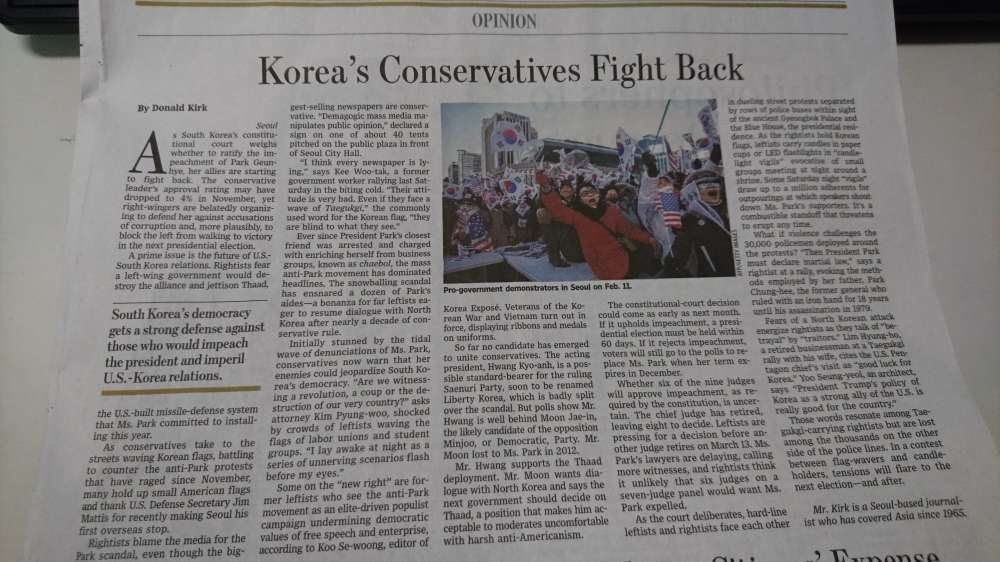Seoul
As South Korea’s constitutional court weighs whether to ratify the impeachment of Park Geun-hye, her allies are starting to fight back. The conservative leader’s approval rating may have dropped to 4% in November, yet right-wingers are belatedly organizing to defend her against accusations of corruption and, more plausibly, to block the left from walking to victory in the next presidential election.
A prime issue is the future of U.S.-South Korea relations. Rightists fear a left-wing government would destroy the alliance and jettison Thaad, the U.S.-built missile-defense system that Ms. Park committed to installing this year.
As conservatives take to the streets waving Korean flags, battling to counter the anti-Park protests that have raged since November, many hold up small American flags and thank U.S. Defense Secretary Jim Mattis for recently making Seoul his first overseas stop.
Rightists blame the media for the Park scandal, even though the biggest-selling newspapers are conservative. “Demagogic mass media manipulates public opinion,” declared a sign on one of about 40 tents pitched on the public plaza in front of Seoul City Hall.
“I think every newspaper is lying,” says Kee Woo-tak, a former government worker rallying last Saturday in the biting cold. “Their attitude is very bad. Even if they face a wave of Taegukgi,” the commonly used word for the Korean flag, “they are blind to what they see.”
Ever since President Park’s closest friend was arrested and charged with enriching herself from business groups, known as chaebol, the mass anti-Park movement has dominated headlines. The snowballing scandal has ensnared a dozen of Park’s aides—a bonanza for far leftists eager to resume dialogue with North Korea after nearly a decade of conservative rule.
Initially stunned by the tidal wave of denunciations of Ms. Park, conservatives now warn that her enemies could jeopardize South Korea’s democracy. “Are we witnessing a revolution, a coup or the destruction of our very country?” asks attorney Kim Pyung-woo, shocked by crowds of leftists waving the flags of labor unions and student groups. “I lay awake at night as a series of unnerving scenarios flash before my eyes.”
Some on the “new right” are former leftists who see the anti-Park movement as an elite-driven populist campaign undermining democratic values of free speech and enterprise, according to Koo Se-woong, editor of Korea Exposé. Veterans of the Korean War and Vietnam turn out in force, displaying ribbons and medals on uniforms.
So far no candidate has emerged to unite conservatives. The acting president, Hwang Kyo-anh, is a possible standard-bearer for the ruling Saenuri Party, soon to be renamed Liberty Korea, which is badly split over the scandal. But polls show Mr. Hwang is well behind Moon Jae-in, the likely candidate of the opposition Minjoo, or Democratic, Party. Mr. Moon lost to Ms. Park in 2012.
Mr. Hwang supports the Thaad deployment. Mr. Moon wants dialogue with North Korea and says the next government should decide on Thaad, a position that makes him acceptable to moderates uncomfortable with harsh anti-Americanism.
The constitutional-court decision could come as early as next month. If it upholds impeachment, a presidential election must be held within 60 days. If it rejects impeachment, voters will still go to the polls to replace Ms. Park when her term expires in December.
Whether six of the nine judges will approve impeachment, as required by the constitution, is uncertain. The chief judge has retired, leaving eight to decide. Leftists are pressing for a decision before another judge retires on March 13. Ms. Park’s lawyers are delaying, calling more witnesses, and rightists think it unlikely that six judges on a seven-judge panel would want Ms. Park expelled.
As the court deliberates, hard-line leftists and rightists face each other in dueling street protests separated by rows of police buses within sight of the ancient Gyeongbok Palace and the Blue House, the presidential residence. As the rightists hold Korean flags, leftists carry candles in paper cups or LED flashlights in “candlelight vigils” evocative of small groups meeting at night around a shrine. Some Saturday night “vigils” draw up to a million adherents for outpourings at which speakers shout down Ms. Park’s supporters. It’s a combustible standoff that threatens to erupt any time.
What if violence challenges the 30,000 policemen deployed around the protests? “Then President Park must declare martial law,” says a rightist at a rally, evoking the methods employed by her father, Park Chung-hee, the former general who ruled with an iron hand for 18 years until his assassination in 1979.
Fears of a North Korean attack energize rightists as they talk of “betrayal” by “traitors.” Lim Hyung-ho, a retired businessman at a Taegukgi rally with his wife, cites the U.S. Pentagon chief’s visit as “good luck for Korea.” Yoo Seung-yeol, an architect, says “President Trump’s policy of Korea as a strong ally of the U.S. is really good for the country.”
Those words resonate among Taegukgi-carrying rightists but are lost among the thousands on the other side of the police lines. In a contest between flag-wavers and candle-holders, tensions will flare to the next election—and after.
Mr. Kirk is a Seoul-based journalist who has covered Asia since 1965



